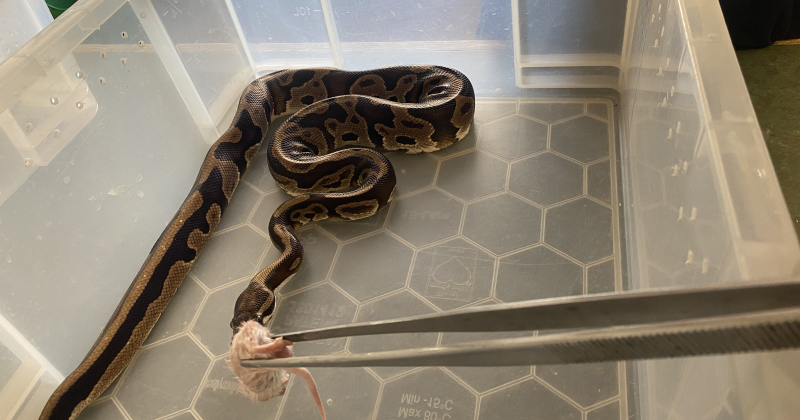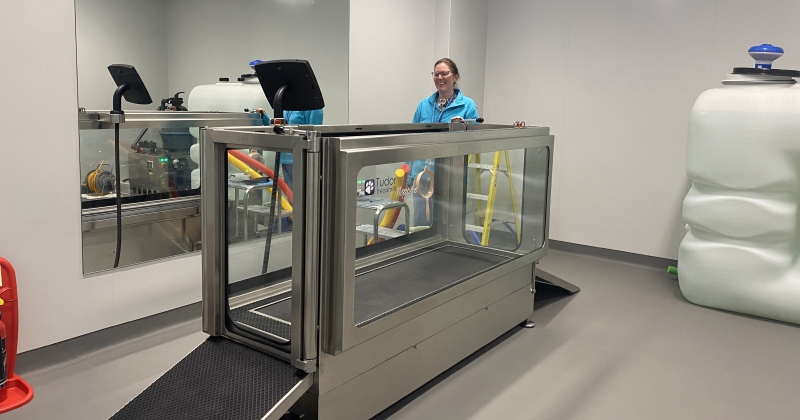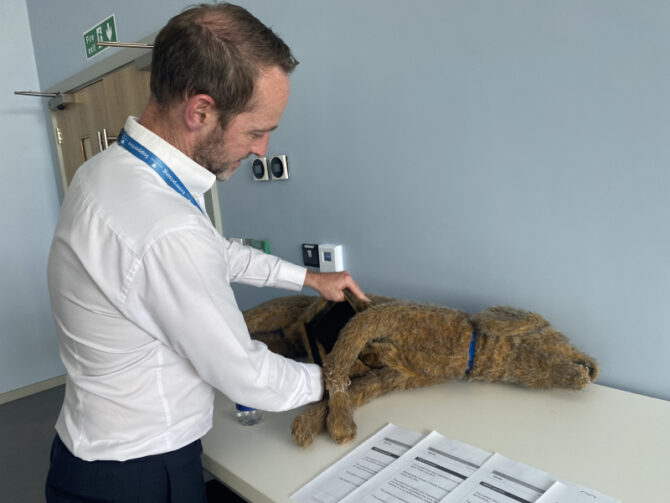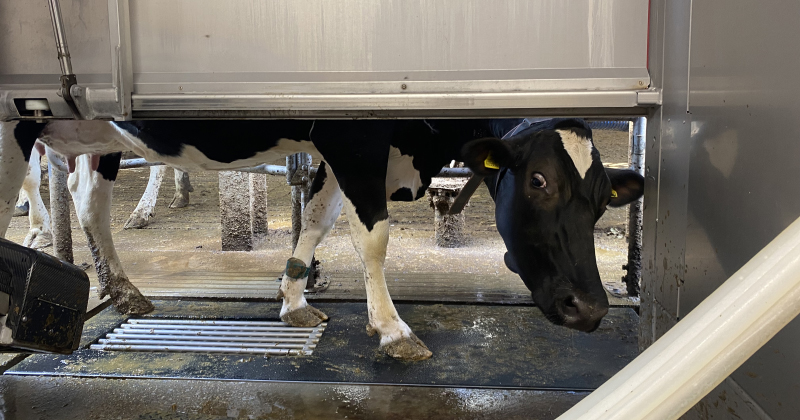As head of a land-based college that has doubled in size, Jeremy Kerswell is attracting students from outside rural communities
And yet, Jeremy Kerswell is surprisingly reluctant to be photographed in his wellies. He fears that doing so might evoke a farming stereotype that is “the antithesis” of the image he wants for his land-based college, which he has “pulled up into the modern age into a very progressive, forward-thinking organisation” in his ten years as principal.
In that time, Plumpton has doubled in size, and Kerswell believes it has had the fastest-growing commercial portfolio of any college in the country.
Perception matters for Kerswell. He similarly believes that the Latin motif decorating a grand doorway that reads “labor omnia vincit” (hard work conquers all) evokes an old mentality of “you go to Plumpton if you’ve got big hands and a strong back” which is “not what this place or the farming industry needs”.
Instead, his college has been “showcasing a different story, working more with employers and schools to target a different audience”. Less than half its students now come from a rural background.
Plumpton’s students are today operating robotic milkers, analysing grape juice sugars in the college’s homegrown sparkling wine, and providing hydrotherapy to dogs. Plans are in place to incorporate data analytics into many of its courses.
It was a very different story when Kerswell arrived in 2015, when the college was “probably on the cusp of Ofsted ‘inadequate’ and a merger through an area review”.
At least six other land-based colleges have succumbed to mergers so far this century, and another (Hadlow in Kent) went into administration. There are only 11 independent land-based colleges left in England, and Plumpton is the only one in the South-East.

Plumper provision
Kerswell credits “flipping hard work” and a “relentless drive to move into industries facing massive skills gaps” for the fact that Plumpton’s turnover has risen from £15.6 million to a predicted £31 million next year, 25 per cent of which is commercial income.
This means that Kerswell’s biggest challenge is keeping up with the pace of demand. Despite spending £30 million on capital projects, including a new agrifood centre and vet studies centre, he admits that “over four days a week you can’t get a classroom or a parking space” on campus.
In Kerswell’s 28-year career in education, he has never had to turn away students. But some of his courses for next year are already full, and being over-subscribed makes it harder to be fully inclusive. “If you’re over-subscribed, even the most inclusive of us – and I am – would be selective, and you’re going to pick not always based on academic attainment but on attitude and readiness to learn.”

Meercats, emus and a church
There is no shortage of animals about on campus. A menacing-looking snake is being hand-fed a mouse (thankfully through gauntlet gloves and large forceps) inside the animal centre, and new enclosures for meercats, lemurs and otters are being built ready for September.
Land-based colleges are the envy of the rest of the FE sector for their idyllic settings, and Plumpton, which turns 100 next year, is certainly no exception, with its main buildings looking out on to the rolling hills of the South Downs.
From classrooms, students can glimpse emus and donkeys, and a 12th century church that houses one of the oldest bell towers in the country.
It opens to the community once a week, with students “drifting in and having the sorts of conversations with people that you have with your grandparents”.
Kerswell prides himself on keeping his college in tiptop condition; he never seems to switch off from litter patrol.
“To teach people about horticulture, our grounds have got to be presented to the higher standards…when we’re making wine, the wine’s got to be flipping brilliant. That lifting of the bar isn’t just about pedagogy,” he says.

A 250-year-old walled garden that Plumpton’s horticultural students helped restore and now manage in nearby Stanmer Park has become an exemplar of the college’s high standards, and “done more for our brand than anything else”.
In four years, One Garden Brighton has had a million visitors and helped Plumpton secure a 70 per cent increase in 16- to 24-year-olds studying horticulture “bucking all the national trends” for the “very misunderstood” horticultural sector, which is generally seen as something “your grandparents did”.
But it is a “huge responsibility” for Plumpton as custodian of 2,000 acres of land, some of which covers a site of special scientific interest. Mishaps do happen. In 2020, the college was fined £50,000 after management failings caused slurry to pollute a nearby stream.
Kerswell admits it was “one of those career moments that you want to bury deep”.
“The bit that hurt was that it had been happening for years and years. It’s happened once on my watch, and I got years’ worth of hate,” he says, “but for every complaint that doesn’t hit your high notes, there’s an opportunity to learn.”

Landex role
In addition to his role at Plumpton, Kerswell is chair of Landex – Land Based Colleges Aspiring to Excellence – which has nearly 40 members. And Kerswell believes there has “never been a more important time” for their sector, as it sits at the crux of the “three big global challenges” – food security, environmental sustainability and health.
But with so many other land-based colleges having merged with their local general FE colleges or college groups in recent years, Kerswell fears some land-based provision is being “marginalised”.
There are “not many examples” of merged land-based colleges where they are still “able to meet the strategic needs of the sector and community around them as effectively as they perhaps should” he says.
Whereas Plumpton’s strategic plan is informed by the land-based sector it serves, that is “not the case where land-based is a small faculty in a much bigger organisation”, he says, adding: “It’s very easy for that [designated specialist funding that land-based provision receives] to get lost and therefore not be spent in the right way.”
Kerswell sees Landex’s role as being to “ensure we’re protecting that investment”.

Kerswell wants to see more recognition in funding allocations for the capital costs of providing residential accommodation and travel, given land-based colleges’ rural locations.
And there is an opportunity for Landex to “far better promote the green skills agenda for environmental sustainability, as all too often conversations are about retrofitting and construction”. He points to how planning law changes mean every planning application needs to demonstrate how it will benefit biodiversity, which “requires a skill set that doesn’t exist in planning authorities at the moment”.
A surge of interest in environmental and sustainability issues is enabling Plumpton to “attract students that wouldn’t otherwise come here”, but jobs in environmental management are so abundant now that Kerswell says: “We could have twice as many students, and they would all still get jobs.”
But Landex’s lobbying role is complicated by the fact that land-based colleges are caught between the Department for Education (DfE) and the Department for Environment, Food & Rural Affairs in their remit, which “have no relationship whatsoever”.
The plan is for Landex to get Skills England’s new CEOs out visiting a land-based college soon, so they “recognise the value of what we’re doing”.

Fundings highs and lows
Kerswell is also concerned about the ability of colleges like his that are “responding to national skills needs” to access borrowing for capital projects.
When it became clear that Plumpton’s veterinary nursing provision was outgrowing its facility, it applied to become part of an institute of technology to access funding for new provision and planned on borrowing £2.5 million from lenders to make up a shortfall.
But then reclassification happened, delaying the project by 18 months as Plumpton worked on convincing the DfE to lend it the money instead. Because “we don’t give up”, the new facility finally opened two months ago, complete with kennel blocks, consultation rooms, and a hydro pool for dogs. In its mock-up veterinary practice, students can dissect eerily life-like £3,000 dog dummies with removable organs.
But the building is not quite finished (“because DfE played a hard game” on funding), with more rooms being added next year. The investment has had an impact on Plumpton’s financial health, with last year’s accounts stating that it was “disappointing to end the year in a deficit position”.
But there have been funding windfalls lately too; Plumpton got a “quite surprising” 30 to 40 per cent of more money for free courses for jobs than it had been expecting and made a “real success” out of level 3 courses in horticulture, land management and agriculture, with its two intakes a year having both been oversubscribed.

Politics and partnerships
Kerswell never realised before becoming principal (having previous been assistant principal at Bridgwater College) just how immersed in politics the role would be. But he seems to relish that side of the job.
Plumpton was, Kerswell believes, “a bit too complacent, cozy, nostalgic and paternalistic” when he arrived, and he was not surprised when it was rated as ‘requiring improvement’ six months later.
He took the helm just as Sussex was named in the first wave of area reviews and believes that “had we not moved so quickly in driving change”, Plumpton would “definitely” have been merged with East Sussex College of Chichester College Group.

Wine, wellies and robots
When Kerswell arrived at Plumpton, it was already producing large quantities of wine, but much of that was then consumed by its staff and students. Kerswell decided to turn the process into a commercial endeavour instead.
Next year, the college is expecting to sell £250,000 of wine, with the aim of becoming profitable over the next three years. But with the UK’s wine industry still in a fledgling state, there is a tension between wanting to demonstrate the quality of their wine and “not wanting to compete with industry”.
Kerswell says although the quality of English wine is good, there are issues with yield and productivity that affect prices and present a risk to the industry.
Plumpton is being supported by the Department for Science, Innovation and Technology to plant a new vineyard with a “level of automation and data analytics that we think will be the first of its kind globally”, to find ways of driving up productivity.
“When you add in all the robots, we should be able to demonstrate a different way of doing things,” he says.
Clutching my complimentary bottle of Plumpton wine that Kerswell hands me, we enter Plumpton’s “biosecurity centre” (where hands are washed and wellies are donned) before entering the college’s farm. With a “huge number” of animal diseases now circulating in Europe, hygiene is paramount.
The college’s robot feeder, which is meant to be pushing the cows’ feed towards them to ensure a constant supply, has “wandered off”. Luckily, the robotic milker lacks the ability to go walkabout and there is a steady line of cows waiting for it to milk them.

Kerswell argues that the robots create “different jobs with different skill sets”, rather than taking jobs away from farms. “They still need a stock person with husbandry skills, but farmers aren’t necessarily getting up at 4am and milking cows. They might be getting up at 6am and analysing the data that the robots are generating on each cow’s fertility, health and productivity.”
Data analytics is being embedded into many of Plumpton’s courses, and technologically advanced facilities havehelped it to triple its agriculture student numbers in three years.
The college has still retained its traditional milking parlour, so its students can learn both systems.
“We’re here to enable the community farming industry to come in and learn from what we do,” says Kerswell. “The future of global food production is about getting that right balance between feeding the world and saving the planet. Right at the heart of that has to be highly productive feeding systems, which is about individualized animal performance informed by data, enhanced by robotics.”
Plumpton’s new conference facility also provides a place for those currently working in the land-based industries undergoing a “once in a generation change” an opportunity to debate the issues facing them, including “tax, sustainability, productivity and uptake of technology and skills”.
Kerswell says some of them feel “in crisis”, and “ a lot” are “burying their heads in the sands”.
“We’re playing that pivotal role and bringing them together to talk about it.”








Your thoughts